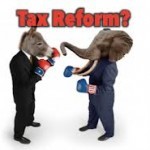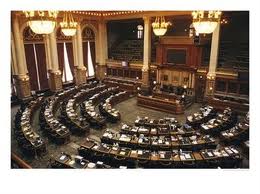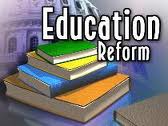
by | Apr 23, 2013
 Despite both Parties rhetoric to the contrary, I am hearing the chances of any significant Commercial Tax Reform in Iowa is dwindling.
Despite both Parties rhetoric to the contrary, I am hearing the chances of any significant Commercial Tax Reform in Iowa is dwindling.
Though legislation has passed each chamber, the Conference Committee tasked with finding a compromise both sides are comfortable with will struggle mightily. This is largely due to the fact that the structure for reforming the tax code that passed by each chamber are not compatible with each other. While Senate Democrats are insisting on a tax credit formula which businesses apply for and are granted, the House Republicans and the Governor want changes to the percentage assessed values are taxed at as well as lower caps on local property taxes.
I highly doubt that either side will give much on their chosen structure for reform, and it is hard to imagine a combination of these approaches being melded together without a confusing mess being created. Additionally, as desperate as Republicans are to deliver lower taxes to their constituents, there is a feeling in the caucus that passing a half-measure now will make it harder to re-visit the issue in future sessions to achieve their true goal. Conversely, Democrats would not mind getting their tax credit approached passed and fighting future battles with Republicans on increasing the value of the credits as they come up.
The Big Picture
After essentially controlling Iowa government for years with only a Senate majority, I don’t see anyway that House Republicans and Gov. Branstad can cave and allow Democrats to dictate the structure of tax reform–the one issue Republicans unquestionably own over Democrats.
As I’ve said here before, I do believe that Sen. Gronstal has a stronger hand than many realize. Much like the Fiscal Cliff debate late last year where Congressional Republicans were forced to give in, Iowa Republicans are in the same tough position of seeing taxes rise if nothing is done. This fact transfers a significant amount of leverage to Senate Democrats and Sen. Gronstal is operating accordingly. As long as Senate Democrats perceive they can hold a majority while taxes rise this is the posture that Republicans will face. Looking long term, if Republicans are unable to extract major compromises from Democrats in the conference Committee–which I don’t expect–I am comfortable with once again waiting on a bill altogether.
Though it will be harder than in 2012 and is far from a given, with Branstad on the ballot in 2014 there is a shot at winning the Senate and a likelihood of holding the House. If a bill was done with Republicans holding both chambers and the Governors office clearly the dollar amount and scope of tax relief be much larger. Perhaps more importantly there would also be a significant flat tax component and an opportunity to end the system of automatic future tax increases we have now. The leverage that would be gained in future partisan tax scuffles by doing so would be worth it’s weight in gold.
Research and House Majority Leader Statement
The main bill in focus can be read here (SF 295)…and by the way I dare anyone to read this bill and tell me we can’t find a better way to write tax policy. In contrast, here is the Dix/Whitver optional Flat Tax bill offered earlier this session (SF 443). Should this approach to our taxes be taken most citizens interaction with the tax code could be limited to lines 1-35 of this bill. A welcome thought to a large majority regardless of Party.
Below is the full release from House Majority Leader Linda Upmyer regarding this topic:
Delivering significant property tax relief to the hardworking taxpayers of Iowa has been one of our top priorities since gaining the Majority three years ago. Each year we have passed numerous proposals to the Senate, but unfortunately have not been able to reach a consensus. I am optimistic that this will be the year for true reform.
This week the House passed a comprehensive tax relief proposal that provides significant property tax relief across Iowa and helps reduce Iowans’ income taxes. The bill, SF 295, does not shift the tax burden between classes of property, but instead ensures that relief and reform is permanent, predictable, meaningful, and affects all classes of property. If no action is taken on property tax relief, Iowa’s taxpayers are staring down the barrel of a $2.6 billion property tax increase over the next 10 years, with the majority of that falling to homeowners.
Under our current state tax structure, residential property taxpayers pay approximately half of Iowa’s property taxes. While our proposal provides property tax relief across all classes of property, residential property taxpayers would benefit the most under this plan.
Currently, in terms of K-12 school funding, the state covers 87.5% of the school foundation formula. The remaining amount needed for our schools to operate falls on the backs of local property taxpayers. Our proposal increases the amount of state aid going to our schools and decreases the reliance on local property taxes. As a result, local property taxpayers will be protected from future tax increases.
Our proposal would also implement a 20 percent rollback of taxable value on commercial and industrial property, which would occur over a period of four years, at five percent each year. This would provide approximately $339 million in property tax relief when fully implemented. Additionally, our plan would include a standing unlimited appropriation to backfill lost revenue from the rollback to local governments.
As previously mentioned, the bill also aims to reduce Iowans’ income taxes by giving individuals a choice to file under the current system or to use a 4.5 percent flat tax option. This legislation makes Iowa’s tax system simpler, flatter, and fairer. Under this proposal, each taxpayer is given a choice that will enable them to do what makes the most sense for their own household budget.
Finally, our proposal would send dollars back to Iowa taxpayers that have been collected in the Taxpayer Trust Fund. Only after the Legislature and Governor have agreed to a final budget that meets the priorities of Iowans and funds the state’s obligations, any excess revenue would be returned to Iowa’s hardworking taxpayers.
SF 295 passed the House with bipartisan support and was sent back to the Senate for their consideration. We look forward to continuing this discussion, listening to all ideas and proposals, and are hopeful a resolution will soon be reached that provides much-needed and real tax relief to all Iowans.

by | Apr 16, 2013
 Question: What has happened so far at the Statehouse this session?
Question: What has happened so far at the Statehouse this session?
Answer: Mostly a whole lot of nothing.
With potentially as little as three weeks left before they gavel out this has been one of the most uneventful sessions since I began following them closely. There could still be some fireworks in store as the larger ticket items get discussed, but as it stands now nearly everything Governor Branstad has signed into law has been with near unanimous consent from both Parties. In fact, of the 36 bills he has signed so far most have been technical or clerical items passed with no dissent—and all but a couple have had no more than 3 no votes between the two chambers (notable exceptions being SF 184 and HF 160).
Conservatives Left with Little to Cheer About
The fact that divided government is not producing sweeping changes is hardly surprising, but getting no movement whatsoever on traditionally non-entrenched ideological issues is disheartening. For me personally these disappointments include the first funnel costing any chance of banning Automated Traffic Enforcement and the second funnel claiming the Voter ID bill. Both these issues have a clear majority of public support (Voter ID routinely gets well over 70% in public polls), and despite this couldn’t even receive the dignity of a vote.
Additionally, the Education Reform effort (yes, even the version the Republican House passed with no inter-Party dissent) is a “solution†few true Conservatives can embrace. Firstly, it is dumping $200 million more dollars into a system that already has received a 35.4% funding increase since 2002—with no discernible benefit in most districts. And secondly, the kind of actionable teacher evaluation, similar to what exists in the private sector, is nowhere to be found. Instead, in my view, what this reform offers is a largely a bunch of feel good jargon about “laddersâ€, “career pathwaysâ€, “mentorsâ€, and “master teachersâ€â€”now does that sound like a recipe for fixing a failing school?
In some way this issue has been absurdly overcomplicated, how about teachers just teach kids the information in their textbooks like miraculously you were able to do in the 1990’s and we’ll call it even. In fact, prove you can do so and we will give you a nice raise…you know the way it has worked for all the rest of us in the private sector since our birth.
While it is true that many strong home schooling amendments got passed by the House, A) the big ones won’t make it to the Governor’s desk, and B) even if they did it still wouldn’t make this effort worthwhile. And while there are a few bright spots (HF 625 which expands STO’s), there was no movement of Sen. Zaun’s proposal last session to give parents true schools choice, nor was there any effort made to ensure we have strict 3rd grade retention for reading proficiency.
Tax Reform the Big Prize…But Likely to Elude Again
Just like last session, there was talk by both sides at the beginning that something needed to get done here, but the writing is on the wall that it won’t.
Largely this is because the players and the policies they are pushing for are essentially unchanged from last year. Additionally I am starting to think that Sen. Gronstal knows he controls only one branch—but perhaps has the trump card in this standoff.
The way I have started to look at this is to see the similarities between this situation and the fiscal cliff scenario faced by Republicans on the Federal level at the end of last year. If you recall, Republicans were forced into caving because the specific position they were in—if no deal was struck taxes on everyone in the country would go up on January 1st. Similarly, here in Iowa if nothing gets done our tax rates will continue to climb—a reality that would surely bother Republicans more than Democrats. Not only does this give Gronstal more leverage in cutting a deal to avoid the tax hikes, if he can manage to stave off a deal until rates are raised he is in the position of deciding then who “deserves†tax cuts. As frustrating as this tactic is for Republicans, as long as high taxes don’t cost Democrats their majority it is truly brilliant politics.
The Truth As I see ItÂ
I would love to be able to say everything is looking up here in Iowa and nationwide, but the evidence disagrees. Coming off a brutal performance last November when Mitt Romney was unable to defeat a president with a terrible record and Republicans failed to take the Iowa Senate, we are now seeing the results. This legislative session is almost a mirror copy of the last and the chances of anything passing at all are slim–and unfortunately the chances of passing any significant Conservative policy is hopeless. Simply put, at the moment the landscape is virtually barren when it comes to potential political victories.
Elections indeed have consequences–and Conservatives are feeling them now. We must do better as a Party going forward–2014 awaits and brings another chance to make a profound and positive legislative impact.

by | Jan 16, 2013
 Later this session the Iowa Legislature will debate various measures, namely the Governor’s, designed to improve the performance of our state’s K-12 schools. There are three main components to the Governor’s proposal and in a continuing series we will look at each separately. Today we start with the most expensive—the $160 million for increasing the base teacher salary from $28,000 to $35,000 over the next three years.
Later this session the Iowa Legislature will debate various measures, namely the Governor’s, designed to improve the performance of our state’s K-12 schools. There are three main components to the Governor’s proposal and in a continuing series we will look at each separately. Today we start with the most expensive—the $160 million for increasing the base teacher salary from $28,000 to $35,000 over the next three years.
First things first here, before they appropriate an additional dime of taxpayer money to this system it is both fair and prudent that at least three simple questions be asked and answered—Who are the great teachers in Iowa? Who are the average teachers? and Who are the bad teachers?
To clarify, by “who†I mean a literal list of names district by district categorizing each teacher as great, average, or poor in terms of classroom performance. Though this sounds simplistic I think most Iowans would be shocked to know how complicated a question this really is—and even further shocked to find out that nobody in the education bureaucracy can currently answer these questions definitively.
All we hear from both political parties is we have great teachers in Iowa, and to both reward this greatness and make sure we have great teachers in the future we have to pay them more. Even though it’s just as pertinent to fixing the problem, and because it’s not pleasant or politically correct, we never hear about bad teachers in our classrooms. You would think the first step in solving this problem, as it would be in the private sector, would be determine which employees are not performing their jobs at a high level.
While there is no doubt I am skeptical of most of these individual proposals I will reserve judgment and keep an open mind as legislation is crafted and various amendments are added. I don’t need to agree with all elements of the final product to support it, but do have to feel that it at least identifies the problem specifically. As with all issues there is both a policy and a political aspect that need examined.
The Policy
From a policy perspective, to just approve a blanket increase in pay when a majority of our schools are functioning very well is silly—and to spend this money with no clear goal or way of measuring success is flat-out nonsensical. Common sense says that in order for anyone, especially a Republican, to support a final bill it would have to contain clear benchmarks and ways of actually proving results were being delivered for the extra pay. As it stands now the approach seems to be let’s just pay teachers more money and in theory kids will learn more—which hasn’t proven to be the case in the past.
To make the point beyond question that we have already tried the increased funding approach, one needs only to consider the following three statistics: 1) since 2002 education appropriations to K-12 schools in Iowa has increased $650 million (+35.4%), 2) the average teacher salary in Iowa has increased from $36,480 in 2001 to $49,622 in 2010, and 3) 4% allowable growth was given every year from 2006 to 2010. In spite of all these amazing numbers, here we are again talking about more money.
What few seem willing to say is that when a school is failing there are only three actors involved to shoulder the blame—the teachers, the parents, or the students. Simply put, one of the three, or a combination of all three, are at fault when a school is failing. When looking at the teachers one obvious element is missing—a way to fairly evaluate how good each one is and how much money they deserve. Until this gets determined one senses that no amount of increased spending will do the trick. Here is what I propose.
While unsympathetic to their concerns regarding “teaching to a testâ€, I’m relatively sympathetic to teacher’s arguments that there are many factors out of their control determining a classes’ progress throughout a school year. Taking this into account my initial thought on a fair formula to evaluate our teachers (and hence dictate future pay) would look like this: 25%= credit for years on the job and the resulting experience (this would be automatic much like the step and lane increases in the current formula), 25%= based on student achievement using a baseline for the class coming in compared to their results going out, and 50%= determined by a yearly grading and evaluation by their direct superior (usually their principal).
The Politics
From a political standpoint the construct of the increased pay proposal seems to be offering Democrats (the teachers’ union) the following: we will increase teacher pay in exchange for allowing student achievement to be factored in to teacher evaluation. In my view Republicans shouldn’t be bargaining for a student achievement metric in evaluations—they should be demanding it. This should be a reality both because it makes perfect sense, and because past reforms and increases in pay have not solved the problem. Republicans should be able to win on the political argument that, in order to fix the problem, Iowans need to know which teachers are adequately doing their jobs.
If there is a political trade to be made in exchange for increasing teacher pay it should be for a significant look at the benefits of true school choice for parents. In my mind this would be a four year pilot program in which parents at all failing and sub-standard schools in Des Moines would have the freedom to spend the per-pupil cost attached to their child at any school they chose (with transportation being the responsibility of each participating parent). All students involved would have their progress tracked, with reports being given to the legislature after years 2 and 4. This would be similar in principal to the Zaun study bill from last session without all the “extreme†elements, like abolishing the Dept. of Education etc.
I would love to see baby-steps being taken in this direction, and would dare the teachers’ union to make the argument to Iowans that the well-being of the teachers and their union trumps that of a student in a failing school which they staff.
Conclusion
Given the history of failure in select districts and the many fruitless past funding increases, in general I believe the Republican hand on education reform is stronger than the Governor’s proposal recognizes. There is little reason the argument can’t be made that we have tried the teachers’ union way of never assigning blame and increasing spending—and it has not worked. If there is going to be reform, let us at least not try the same blanket increases in spending and hope for a different result. Instead we should identify the shortcomings in the flawed districts and fix them specifically.

by Steven Waechter | Nov 28, 2012
 The tax credit for wind energy is back on the agenda, and Iowa’s own Chuck Grassley and Terry Branstad are taking leadership roles in fighting for the extension, going so far as to appear together at a press conference about it.
The tax credit for wind energy is back on the agenda, and Iowa’s own Chuck Grassley and Terry Branstad are taking leadership roles in fighting for the extension, going so far as to appear together at a press conference about it.
Wind energy is my favorite target at the moment, because it combines socialist economics, corruption, aesthetic vandalism, junk science, and cynical political machinations – all melting together into a hideous soup of wasted money and ruined skylines.
Tough Love
After the last election, targeting two of Iowa’s best known Republicans for criticism is perhaps a risky business, but for those who think I – with my dislike of leftists – shouldn’t be doing it, I offer the following historical analogy:
In the days of the Roman legions, the centurions were legendary for their swift discipline. One centurion developed a habit of breaking his staff over the backs of soldiers who had acted disobediently. “Give me another,†he would say to his aide when it happened, and it happened so often that “give me another“ became his nickname . In this way, withering cruelty became not a malicious attempt to destroy, but deep concern for long-term wellbeing.
Well, give me another.
Political Venture Capital
Wind energy is an odious political scam. First of all, the industry cannot survive without government subsidy, namely, the tax credits. The wind industry makes profits not from the power grid, but from their tax returns.
It is also ridiculously expensive and underproductive. When Alliant Energy built the Whispering Willows wind farm in Franklin County, they petitioned utilities regulators for a rate hike to help cover the cost. The market had reached a price for electricity, generated by coal, but at that price the wind farm was not economically viable – it wouldn’t produce enough electricity to cover its cost.
They built it anyway. Even though the money in the wind industry is earned on the tax return and not the power grid, they didn’t want to eat an operating loss, so rates have to increase. Consumers in central Iowa found themselves paying more money for the electricity they used – still mostly generated from coal – to pay for a wind farm erected so the utility could earn a tax credit.
The utility sells the power and claims the credits; the landowners earn fees for having these modern art sculptures on their land; the turbines produce just enough electricity to power a massive, metaphorical conveyor belt carrying money from the pockets of poor customers to the rich and the politically-connected… Because that is progress these days.
Grassley stated at the recent news conference that “We have a 20 year investment in this… it would be terrible to throw a way a 20 year investment if it will mature in a short time.â€
We have been waiting for the wind energy industry to mature since the days when pioneer farmers could order a windmill from the Sears and Roebuck catalog. Most of them were dismantled after rural America was electrified. Now, the fantasy is that the same technology that was felled by electricity will be the future of electricity.
Central Dreaming
Nothing becomes outdated faster than a fantasy about the future. This is never more true than when the fantasy has its birth in the minds of politicians; a future brought to you by the same people who bring you inflation, wars, and prisons.
The general public is also rapidly becoming too poor to cover higher utility bills, but wind energy fits into the political rhetoric of our time and so they charge forward. Wind energy doesn’t make power cheaper, reduce our trade deficit, strengthen the dollar, or generate tax revenue – but it can get you elected.  It employs only a handful of people, especially when compared to the coal industry – which politicians have threatened to kill. The turbines themselves are insanely ugly, and provide a far too convenient backdrop for political photo opportunities.
I understand that this is politics. I also object to the fact that this is politics. The experience of subsidized public housing should have been enough to dispel the urge to make fantasy into reality, but it wasn’t. We will all pay the price. Literally.

by | Oct 15, 2012
 Iowans all across the state were shocked and saddened this morning by the news that Senator Pat Ward had passed away after losing her battle with breast cancer. She had served as a Republican in the Iowa Senate since 2004 and was an extremely respected woman and legislator. The following are statements released by Governor Branstad, Lt. Governor Kim Reynolds, and Republican Party of Iowa Chairman A.J Spiker, and TCR Publisher Art Smith.
Iowans all across the state were shocked and saddened this morning by the news that Senator Pat Ward had passed away after losing her battle with breast cancer. She had served as a Republican in the Iowa Senate since 2004 and was an extremely respected woman and legislator. The following are statements released by Governor Branstad, Lt. Governor Kim Reynolds, and Republican Party of Iowa Chairman A.J Spiker, and TCR Publisher Art Smith.
All of us at The Conservative Reader pass on our sincere condolences to the Ward family. Â She will be missed.
        **********************************************************************
Governor Branstad
“I was with shock and sadness that learned of my friend Pat Ward’s passing. She had a wonderful career in public service, and was such a caring and passionate person. As a senator, she was a champion for her district, took the time to get to know the issues, and worked in a bipartisan manner to enact meaningful legislation on behalf of her constituents. She always had a positive outlook on life, even in illness, and her smile would brighten each room she entered. The thoughts and prayers of Chris and I are extended to her large network of family, friends and constituents.â€
Lt. Governor Reynolds
“Having served with Pat in the Senate, I witnessed firsthand her dedication to the state of Iowa, and her incredible work every day on behalf of her constituents. Pat Ward was a dear friend, and the news of her passing is incredibly difficult and painful to hear. I hope all Iowans will look at her example, the way she cared for others and worked to make the world a better place, and remember her significant life and achievements. Our administration will miss her as a policy maker, and we all will personally miss her as a friend.â€
RPI Chairman A.J Spiker
“I am saddened to learn of the passing of Iowa State Senator Pat Ward. Public service and dedication to the people of Iowa were hallmarks of her career. On behalf of all Iowa Republicans, I would like to express our gratitude for Pat’s service to the people of Iowa. Our thoughts and prayers are with Pat’s friends and family during this difficult time.”
TCR Publisher Art Smith
“Pat was a kind and dedicated woman who was always interested in hearing the opinions of others, especially her constituents.  During my brief opportunities in speaking with Pat, I found her to be charming and very well informed on the issues.  As my senator, I was surprised that she not only remembered me whenever we crossed paths, but on our first acquaintance quickly connected me to a single letter I had written her in the past.  I sincerely admired her person-ability.”

 Despite both Parties rhetoric to the contrary, I am hearing the chances of any significant Commercial Tax Reform in Iowa is dwindling.
Despite both Parties rhetoric to the contrary, I am hearing the chances of any significant Commercial Tax Reform in Iowa is dwindling.






